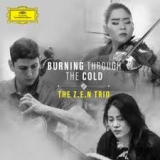Manchmal fragt der Rezensent sich, wie eine Aufnahme zu einem Titel kommt, der wohl werbewirksam sein soll. Oder soll damit in Wahrheit etwas ganz anderes gesagt werden, was zwar nicht positiv ist, aber durch eine scheinbar andere Intention verdeckt wird? Burning through the cold heißt also diese Veröffentlichung. Es ist die zweite des The Z.E.N. Trio im Hause Deutsche Grammophon und widmet sich nun russischem und armenischem Repertoire. Was also brennt da durch die Kälte?
Brennt die Musik durch die stalinistische Kulturkälte, das betrifft dann vor allem das Trio von Shostakovich. Oder soll einfach auf die klimatischen Gegebenheiten abgestellt werden, die, wie der Rezensent in Moskau schon selber erleben durfte, auch mal -45°C erreichen? Das würde dann aber kaum auf Armenien passen, das durch den Kaukasus gegen polare Kälte abgeschirmt ist. Oder soll der Satz auf das Spiel der Musiker abstellen?
Wenn Letzteres der Fall sein sollte, dann ist dem Trio sicherlich nicht abzusprechen, dass es eine kraftvoll impulsive und gleichzeitig durchdachte Darstellung der Musik betreibt, die von technisch hohen Fähigkeiten zeugt. Und auch das Zusammenspiel der jungen Musiker ist von guter Abstimmung geprägt. Da wird teilweise geradezu markant gehämmert, was bei der intensiven Komposition von Shostakovich passt, die neben seiner allgemeinen Konfrontation mit dem stalinistischen System hier vor allem durch den Verlust seines engsten Freundes Ivan Sollertinski geprägt ist, also quasi ein Requiem geworden ist. Das macht zunächst einen mitreißenden Eindruck. Je länger die CD läuft, desto mehr bleibt aber der Eindruck haften, dass hier die sicherlich sehr gelungene operative Opulenz den fehlenden Hintergrund, nämlich die interpretatorisch tiefgreifende Auseinandersetzung übertönt. Die Gefühlsebene will sich beim Rezensenten einfach nicht angesprochen fühlen. Auch das Vergleichshören mit anderen Einspielungen hilft da nicht, eher im Gegenteil. Insofern passt dann der CD Titel doch wieder, nur vermutlich anders als gedacht. Die Musik brennt durch die technisch glatte Kälte, nicht durch die interpretatorische Wärme.
Sometimes the reviewer wonders how a recording comes to have a title that is probably intended to be promotional. Or is it really meant to say something completely different, which is not positive but is covered up by a seemingly different intention? ‘Burning Through the Cold’ is the name of this release. It is the second release by The Z.E.N. Trio at Deutsche Grammophon and is dedicated to a Russian Armenian repertoire. So what is burning through the cold?
Is the music burning due to the Stalinist cultural coldness, which then applies above all to Shostakovich’s trio? Or is it simply about climatic conditions, which, as the reviewer himself experienced in Moscow, can sometimes reach -45° C? But that would hardly fit Armenia, which is shielded from polar cold by the Caucasus. Or is the sentence meant to refer to the musicians’ playing?
If the latter is the case, then the trio can certainly not be denied that they perform the music in a powerfully impulsive and at the same time well thought-out manner, which testifies to their high technical skills. And the interplay of the young musicians is also characterized by good coordination. There is some downright striking hammering, quite appropriate in the case of Shostakovich’s intense composition, which, in addition to his general confrontation with the Stalinist system, is marked above all by the loss of his closest friend Ivan Sollertinski. At first, this makes a stirring impression. The longer the CD plays, however, the more the impression remains that here the certainly very successful operative opulence drowns out the missing background, namely the interpretationally profound confrontation. The emotional level simply does not want to feel addressed in the reviewer. Even comparisons with other recordings do not help, rather the opposite. In this respect, the CD title fits again, but probably differently than intended. The music burns through its technically smooth coldness, not through its interpretive warmth.






















